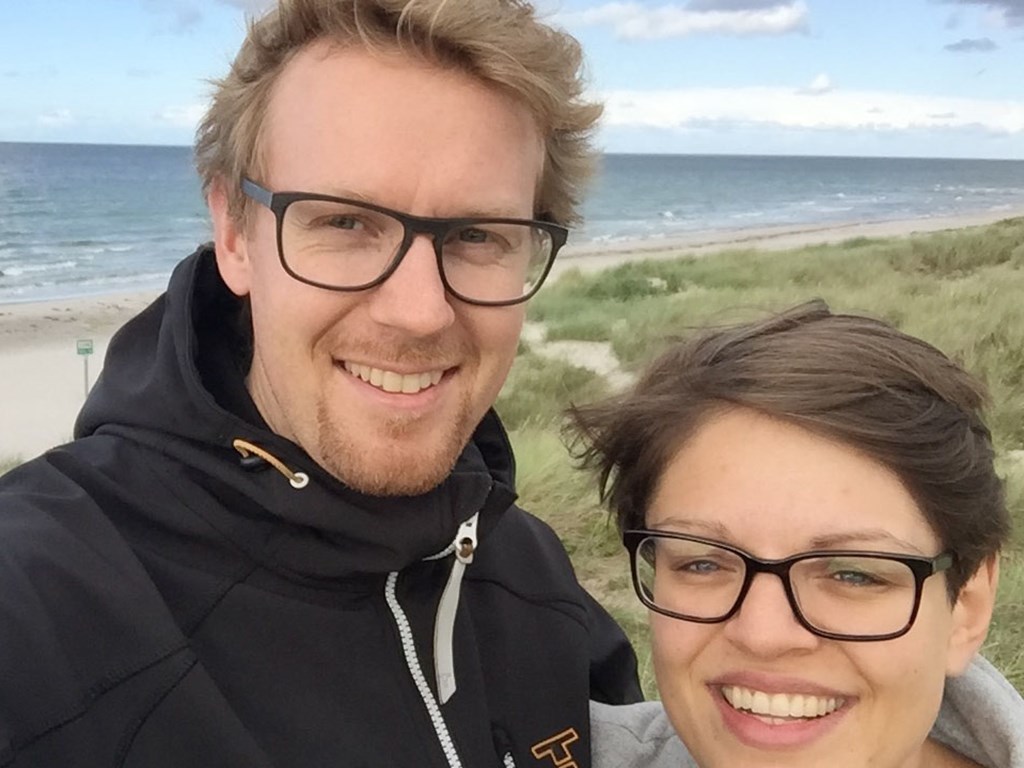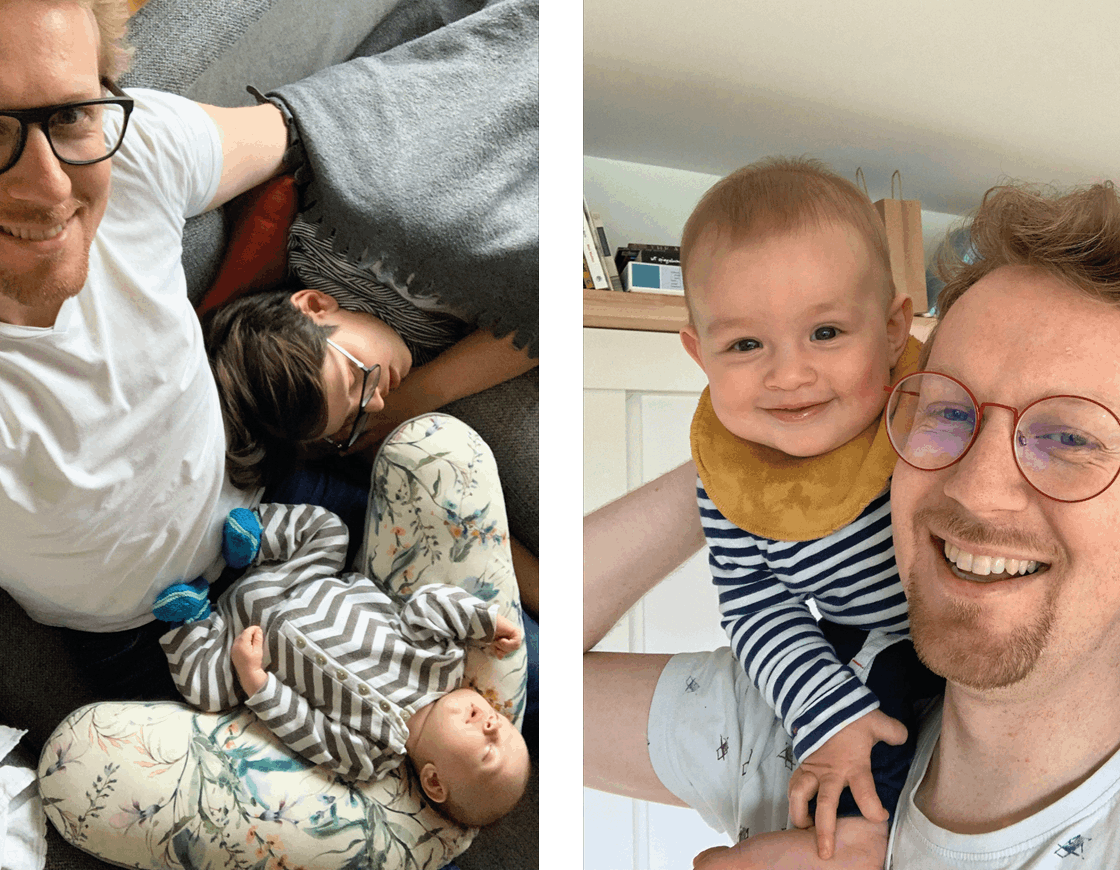Kristoffer is infertile: “My world fell apart when they told me”
What happens when a man finds out he is infertile? In particular, a man who was so ready to realise his dream of having children? For Kristoffer Vitting-Seerup, it is the story of completely breaking down, picking himself back up and - after major considerations - choosing a sperm donor, so little Meta could be born.

Kristoffer and Sabrina Vitting-Seerup.
At the start of 2017, Kristoffer Vitting-Seerup receives a message from his doctor that makes his world come crashing down. The email contains news that will turn his and his wife Sabrina’s biggest and most important dream of becoming parents into a nightmare: Kristoffer is sterile. At this time, they have been trying to get pregnant for nine months.
“I completely fell apart. The consequences were far too great. We called in sick, laid on the couch and tried to comfort each other. It had always been a “when”, never an “if” we should have children. That is why the news was so overwhelming,” says 33-year-old Kristoffer, who lives in Copenhagen, Denmark, with Sabrina and their one-and-a-half-year-old daughter, Meta.
The dream falls apart
The following months are a hazy fog of unmanageable grief. Because when your dream falls apart, what do you do? Should they even have children? Should they even be together?
“During that time, I am going through hell. I lose control of my emotions, which is completely unfamiliar to me. I get extremely upset at the drop of a hat. I'm afraid that Sabrina will decide to leave me. Maybe she would rather find someone else who could actually bring children into the world.”
The idea is that a real man can father children. Therefore, I, and many others, can't be a real man. It is harmful on so many levels.
Otherwise, Kristoffer and Sabrina are ready to start a family. They have known each other since high school and have spent many years building the dream of one day having children together. And to make matters worse, several of their friends break the news that they are pregnant during this period. That is an additional challenge for the couple. As Kristoffer describes it: “Why can they, when we can’t?”
The doctor’s unambiguous message completely crushes the dream of having children by traditional means. Sabrina and Kristoffer have to find a different solution.
The big decision to have fertility treatment
As Sabrina and Kristoffer are trying to navigate their new reality, they decide to be open about their situation. They quickly tell their friends and family, and they are met with support and understanding. Along with the openness, new insights come to the surface. Namely, the number of stories they hear about other couples in their network who struggle with fertility issues.
“There are so many people who need help to get pregnant. Why are we not talking about it? Especially when it is such a widespread problem? Perhaps our openness can help others,” Kristoffer and Sabrina reflect, as they are facing the crisis of their lives.
They experience first-hand that the taboo surrounding infertility is alive and well. There may be a turning point coming, but there is still a long way to go.
“The topic is so sensitive and private, and that is why we have a tendency to not share it with anyone. As a society, we are still very much influenced by the stereotypes of what a real man is. The idea is that a real man can father children. Therefore, I, and many others, can't be a real man. It is harmful on so many levels,” Kristoffer says.
The couple spend the following months picking themselves back up, and both of them go to therapy. Sabrina is quick to announce that she is open to using a sperm donor. Kristoffer, on the other hand, needs time to think about it. After four months, they are about ready to make a big decision. They reach the conclusion that their dream of having children is more important than passing on Kristoffer’s genes.
What is a real father?
However, Kristoffer was worried about his future relationship with a child conceived with the help of a sperm donor.
“I had to be sure I wouldn’t regret it. If we made the decision, it couldn’t ever affect my relationship with the child. Imagine if I looked at the child and thought: “That's not really my child.” When I think back on it now, I realise it was fear and an irrational feeling. Thankfully, I have never actually felt that way.”
There is the genetic father, and then there is the father who is responsible for caring for the child. You are much more of a father if you are the one who is there every day.
However, regardless, the couple’s family life will be different to what they had dreamed of for years. And Kristoffer will not be able to pass on his genes. He had to get used to that idea.
“I had to expand the concept of “father”. There is the genetic father, and then there is the father who is responsible for caring for the child. You are much more of a father if you are the one who is there every day. That is the real father, and that is my role.”
The vulnerable act of choosing a sperm donor
The sperm bank revealed a huge selection of hundreds of potential donors. And how do you make that choice? Kristoffer and Sabrina agree to each set one criterion that the other person cannot veto. Kristoffer chooses education, Sabrina chooses height. By doing that, they are able to narrow the selection down to a handful of candidates.
The couple share the requirement that the child should look like them because then they “can control the conversation” in the future. For that reason, they choose a donor who looks similar to them and today, Kristoffer often hears the phrase: “Wow, Meta looks so much like you.”
“It felt extremely vulnerable and overwhelming to choose a replacement for me. The less I know about the donor, the better. That is why I haven't looked at the extra material attached to the profile. However, we have saved all of it. The more real the person is, the harder it is,” Kristoffer says and adds:
“It is probably a defence mechanism. I can pull up the material on my computer in 30 seconds, but I am not tempted. I keep it at arm’s length, otherwise, it's too hard.”
The best Christmas present
In 2018, Kristoffer and Sabrina get the best possible Christmas present on Christmas Eve: a positive pregnancy test. After a year and a half and 14 treatments, Meta is born in September 2019. Maybe she will be a big sister one day. They have extra eggs stored at the clinic just in case...

When he looks back at the process, it was very extensive and demanding. Because of that, Kristoffer believes today that they should have taken a break during their fertility treatment. Because it was such an intense process.
That is why his best piece of advice to other men who are infertile is something as no-nonsense as take your time:
“First and foremost, you have to control yourself and your psyche. If you make the decision too quickly, it might become a difficult experience. Give it time. You will be a real father. Just like everyone says, regardless of genetics, Meta is MY daughter.”
Kristoffer and Sabrina Vitting-Seerup have created the podcast “What's Taking You So Long?”. The podcast is in Danish and can be found on Danish ebook subscription services like Podimo and E-reolen. The podcast is sponsored by European Sperm Bank.
 Helle Tyllesen
Helle Tyllesen